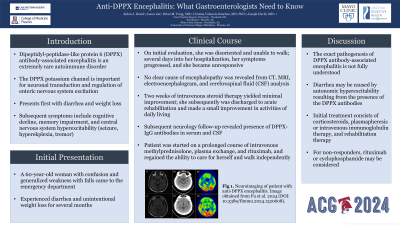Tuesday Poster Session
Category: Functional Bowel Disease
P4076 - Anti-DPPX Encephalitis: What Gastroenterologists Need to Know
Tuesday, October 29, 2024
10:30 AM - 4:00 PM ET
Location: Exhibit Hall E

Has Audio

Jason Lin
Case Western Reserve University
Brooklyn, NY
Presenting Author(s)
Aidan J. David, 1, Jason Lin, 2, Brian M.. Fung, MD3, Cristina Valencia-Sanchez, MD, PhD4, Joseph David, MD5
1Case Western Reserve University, Cleveland, OH; 2Case Western Reserve University, Brooklyn, NY; 3Arizona Digestive Health, Mesa, AZ; 4Mayo Clinic, Phoenix, AZ; 5University of Arizona College of Medicine, Phoenix, AZ
Introduction: Dipeptidyl-peptidase-like protein 6 (DPPX) antibody-associated encephalitis is an extremely rare autoimmune disorder (39 documented cases as of 2017) resulting from the development of antibodies against DPPX, a regulatory potassium channel protein involved in neuronal signal transduction. It frequently initially presents with diarrhea and weight loss, followed by cognitive decline, memory impairment, and a state of central nervous system hyperexcitability that includes seizure, hyperekplexia, myoclonus, and tremor. In the following case, we describe the diagnosis and management of this rare condition.
Case Description/Methods: A 60-year-old woman presented to the emergency department for confusion and generalized weakness with falls. She reported having diarrhea and unintentional weight loss for several months prior. On evaluation, she was noted to be disoriented. She was unable to walk and was completely non-responsive for several days. An extensive neurological work up was performed, including computed tomography and magnetic resonance brain imaging, electroencephalogram, and cerebrospinal fluid analysis, without any clear cause of encephalopathy. She was given two weeks of intravenous steroids with minimal improvement in symptoms. During her hospitalization, she lost 30 pounds. She subsequently was discharged to an acute rehabilitation hospital with some recovery of daily activities. On subsequent neurology follow up, it was noted that serum and cerebrospinal fluid from her initial hospitalization returned positive for DPPX-IgG antibodies, diagnostic for DPPX-IgG encephalitis. With a prolonged course of intravenous methylprednisolone, plasma exchange, and rituximab, the patient made a significant recovery, and regained the ability to care for herself and walk independently.
Discussion: DPPX antibody-associated encephalitis is a rare autoimmune condition that frequently presents with prodromal symptoms of diarrhea and weight loss, as was seen in our patient. While the exact pathogenesis of this condition is incompletely understood, it is hypothesized that diarrhea is caused by autonomic hyperexcitability resulting from the presence of the DPPX antibodies. The disorder responds well to immunotherapy and rehabilitation therapy, with first-line treatment being glucocorticoids. In cases of refractory symptoms, use of an anti-CD20 antibody such as rituximab and plasma exchange can be considered. DPPX antibody-associated encephalitis should be considered in patients with unexplained diarrhea, weight loss, and encephalopathy.
Disclosures:
Aidan J. David, 1, Jason Lin, 2, Brian M.. Fung, MD3, Cristina Valencia-Sanchez, MD, PhD4, Joseph David, MD5. P4076 - Anti-DPPX Encephalitis: What Gastroenterologists Need to Know, ACG 2024 Annual Scientific Meeting Abstracts. Philadelphia, PA: American College of Gastroenterology.
1Case Western Reserve University, Cleveland, OH; 2Case Western Reserve University, Brooklyn, NY; 3Arizona Digestive Health, Mesa, AZ; 4Mayo Clinic, Phoenix, AZ; 5University of Arizona College of Medicine, Phoenix, AZ
Introduction: Dipeptidyl-peptidase-like protein 6 (DPPX) antibody-associated encephalitis is an extremely rare autoimmune disorder (39 documented cases as of 2017) resulting from the development of antibodies against DPPX, a regulatory potassium channel protein involved in neuronal signal transduction. It frequently initially presents with diarrhea and weight loss, followed by cognitive decline, memory impairment, and a state of central nervous system hyperexcitability that includes seizure, hyperekplexia, myoclonus, and tremor. In the following case, we describe the diagnosis and management of this rare condition.
Case Description/Methods: A 60-year-old woman presented to the emergency department for confusion and generalized weakness with falls. She reported having diarrhea and unintentional weight loss for several months prior. On evaluation, she was noted to be disoriented. She was unable to walk and was completely non-responsive for several days. An extensive neurological work up was performed, including computed tomography and magnetic resonance brain imaging, electroencephalogram, and cerebrospinal fluid analysis, without any clear cause of encephalopathy. She was given two weeks of intravenous steroids with minimal improvement in symptoms. During her hospitalization, she lost 30 pounds. She subsequently was discharged to an acute rehabilitation hospital with some recovery of daily activities. On subsequent neurology follow up, it was noted that serum and cerebrospinal fluid from her initial hospitalization returned positive for DPPX-IgG antibodies, diagnostic for DPPX-IgG encephalitis. With a prolonged course of intravenous methylprednisolone, plasma exchange, and rituximab, the patient made a significant recovery, and regained the ability to care for herself and walk independently.
Discussion: DPPX antibody-associated encephalitis is a rare autoimmune condition that frequently presents with prodromal symptoms of diarrhea and weight loss, as was seen in our patient. While the exact pathogenesis of this condition is incompletely understood, it is hypothesized that diarrhea is caused by autonomic hyperexcitability resulting from the presence of the DPPX antibodies. The disorder responds well to immunotherapy and rehabilitation therapy, with first-line treatment being glucocorticoids. In cases of refractory symptoms, use of an anti-CD20 antibody such as rituximab and plasma exchange can be considered. DPPX antibody-associated encephalitis should be considered in patients with unexplained diarrhea, weight loss, and encephalopathy.
Disclosures:
Aidan J. David indicated no relevant financial relationships.
Jason Lin indicated no relevant financial relationships.
Brian Fung indicated no relevant financial relationships.
Cristina Valencia-Sanchez indicated no relevant financial relationships.
Joseph David indicated no relevant financial relationships.
Aidan J. David, 1, Jason Lin, 2, Brian M.. Fung, MD3, Cristina Valencia-Sanchez, MD, PhD4, Joseph David, MD5. P4076 - Anti-DPPX Encephalitis: What Gastroenterologists Need to Know, ACG 2024 Annual Scientific Meeting Abstracts. Philadelphia, PA: American College of Gastroenterology.
